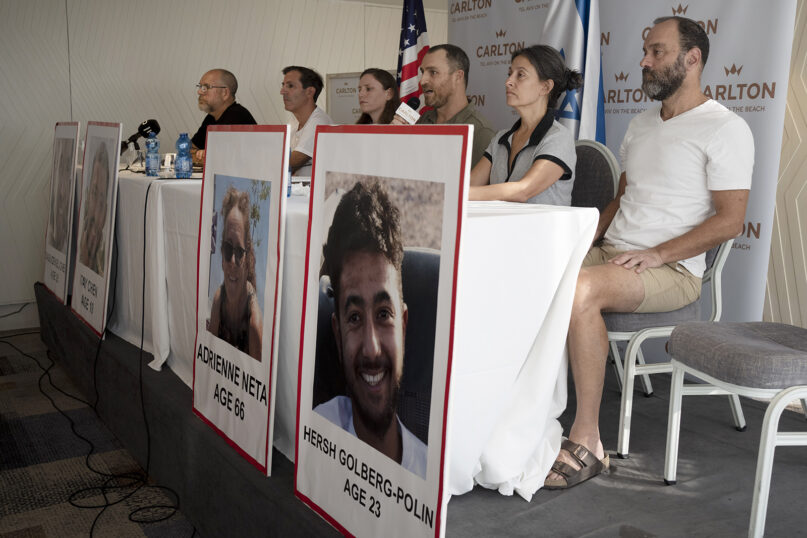(RNS) — Each morning when she gets up, Rachel Goldberg takes a blank white sticker and a black marker and notes the number of days since her son was taken hostage.
On Wednesday (Nov. 8), Day 33, she stuck the sticker on her breastbone, just below her clavicle. Later, on a Zoom call with activists working for the release of the hostages, the sticker had migrated to her cream-colored blouse.
One thing doesn’t change, though — her expression. With her black hair pulled back in a bun and graying at the temples, she looks drained and detached — the weight of the nightmarish ordeal she has been undergoing plainly visible.
In the month since her 23-year-old son, Hersh Goldberg-Polin, was taken hostage by Hamas, Rachel Goldberg has been working feverishly to get him back. In the process, she has emerged as one of the most prominent spokespersons for the hostages, more than 200 of them grabbed by Hamas during its incursion into Israel and presumably being kept in a maze of underground tunnels in Gaza.
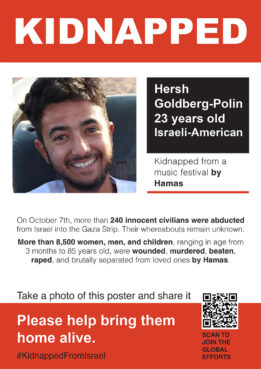
A poster about Hersh Goldberg-Polin’s kidnapping. (Courtesy image)
These days, Goldberg rises early. She gives 10 to 15 interviews a day, and with a team of public relations volunteers, tries to map out new ways to keep the world’s attention focused on the demand for the release of the hostages.
She has addressed the United Nations in New York. She has spoken on the phone with President Joe Biden. She has met twice with Secretary of State Antony Blinken. She and her husband, Jonathan Polin, have appeared on ABC’s “Nightline,” CNN’s “Anderson Cooper 360″ and a host of other TV news shows.
Time is ticking, and like Sisyphus, who rolls a heavy stone uphill, only to have it roll down again, Goldberg feels the awesome weight of her labors.
“Jon always says we have one mission — to bring Hersh and these other hostages home,” Goldberg said. “So if we wake up and that hasn’t happened, we have failed, and we have to start over again.”
Since 2008, Goldberg, Polin, their son Hersh and daughters Leebie and Orly have lived in Jerusalem. They are among an estimated 600,000 U.S. citizens who live in the region, many of them Jews who have made “aliyah,” the official term for immigration to Israel. Ten of those U.S. citizens, including Hersh, who was born in Berkeley, California, are now believed to be held by Hamas.
Goldberg and Polin are observant Jews. The couple were classmates at Ida Crown Jewish Academy in Skokie, Illinois, a modern Orthodox high school, and married several years later. They still keep tradition.
On the evening of Oct. 6, a Friday, the family went to synagogue. Later, they gathered with friends to enjoy the traditional Shabbat evening meal. Sitting outdoors with friends, Goldberg and Polin laid their hands on their son’s head and recited the traditional priestly blessing as countless Jewish parents do on Shabbat. Later that night, Hersh strapped on his backpack, kissed his mother goodbye and told her he was meeting up with his childhood friend, Aner Shapiro.
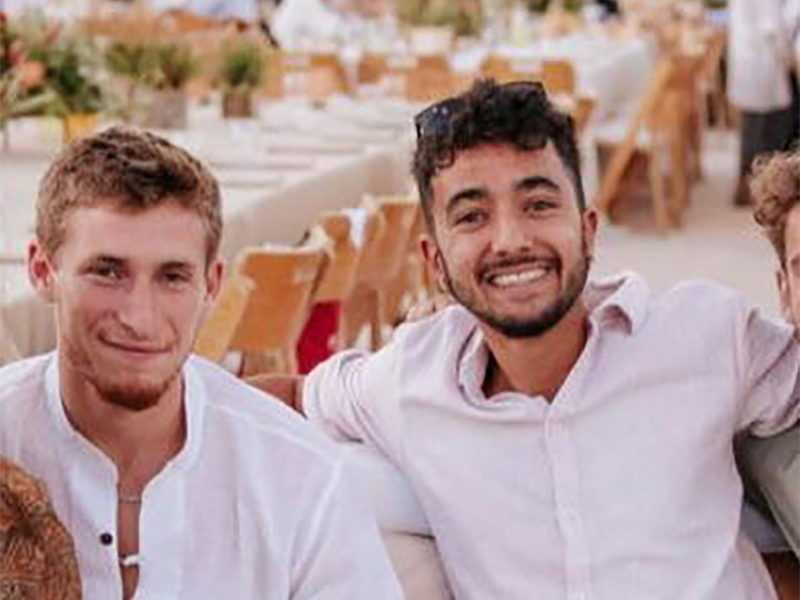
Aner Shapiro, left, and Hersh Goldberg-Polin. (Courtesy photo)
Just a few months ago, Hersh returned from five weeks in Europe, where he attended music festivals in six countries. Now he was headed to another.
“He loves music,” Goldberg said. “He was very into trance music, which I think is loud and annoying, but he really liked it.”
The all-night Supernova festival drew thousands of participants from all over Israel to a field about three miles from the Gaza border. Early on Oct. 7, Hamas gunmen raided the festival grounds and started shooting.
Hersh and two dozen others ran to a nearby bomb shelter, but Hamas fighters found them and began lobbing grenades into the shelter, according to recovered video footage and an eyewitness account. Hersh’s left arm was blown off. His friend, Shapiro, was killed.
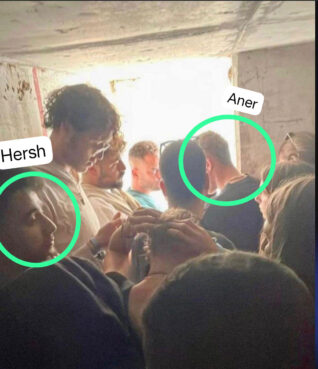
Hersh Goldberg-Polin, left, and Aner Shapiro, right, in a shelter with other festival attendees in southern Israel on Oct. 7 2023. (Courtesy photo)
Herded out of the shelter at gunpoint and loaded onto a pickup truck headed toward Gaza, Hersh managed to send two messages via WhatsApp.
“I love you,” he texted his mother. And, “I’m sorry.”
Goldberg, who normally shuts down her cellphone on the Sabbath, had turned it on this Saturday morning — an exception she made after air sirens started blaring in Jerusalem and she and her daughters headed for shelter.
She immediately texted him back. Hersh never responded. Later, she learned his last cellphone signal was found inside of Gaza at 10:25 a.m.
These days, two Israeli government officials assigned to the family check in with the Goldberg-Polins every day, to see how they’re coping. She appreciates the concern but added, “They can’t tell us very much.”
It’s not a scenario she ever imagined.
RELATED: Haredi Jews, exempt from Israel’s military service mandate, sign up to fight Hamas
In the early aughts, she and Jon and Hersh were living in Richmond, Virginia.
One night, Goldberg said, she had an epiphany. Jon had always wanted to live in Israel. She didn’t want to wake up beside him one day and regret that they never tried to live there.
“We talked about how we have this opportunity that our great-grandparents and great-great-grandparents didn’t have,” Goldberg said. “There’s this Jewish place that you can live as a Jew comfortably. Let’s get on the ride. Let’s try that adventure.”
They were both almost 40 when they moved. And the first years were hard. Hersh, who was 7, struggled to learn a new language and catch up with his classmates. He eventually did.
Jon found a job working in the high-tech industry on the business side. Goldberg worked as a school learning specialist.
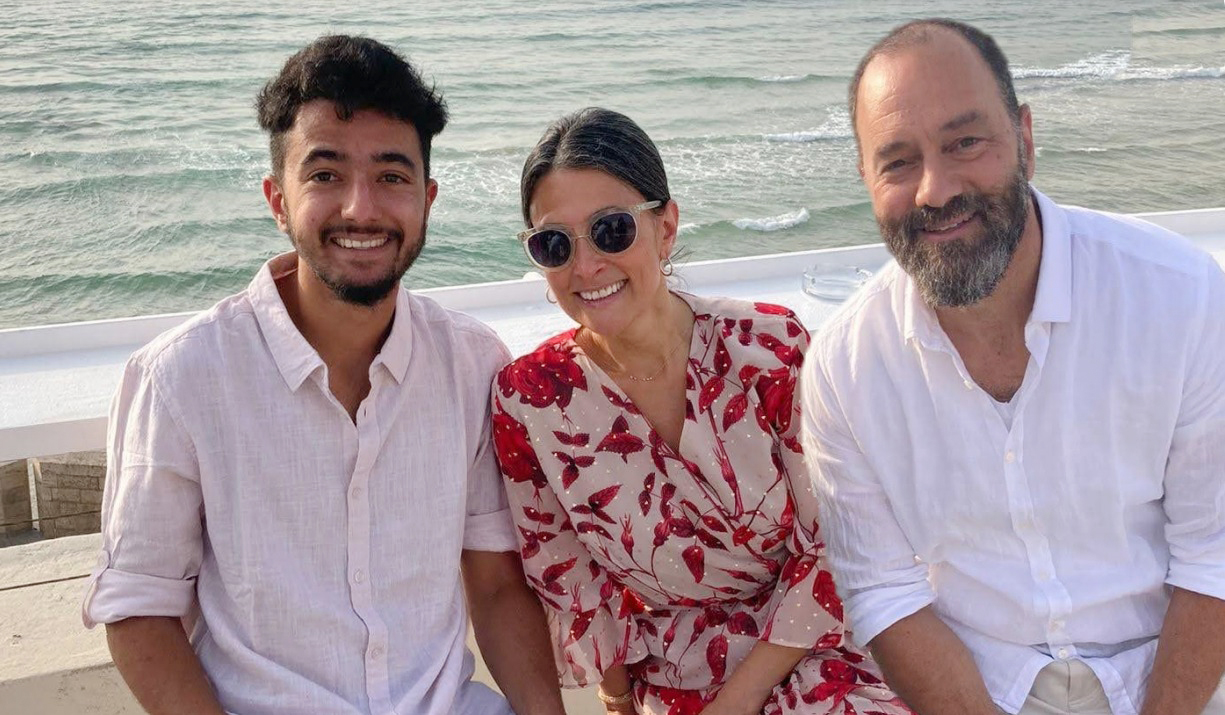
Hersh Goldberg-Polin, left, with his parents, Rachel Goldberg and Jon Polin. (Courtesy photo)
Now she’s on leave, and struggling with a new job not of her choosing.
“There’s no rulebook to explain how you walk through this — not in strategy or in an emotional, psychological way,” Goldberg said. “It’s not really describable.”
Rachel and Jon now take tranquilizers to try to sleep. Often they can’t. On a Tuesday morning, before her endless Zoom interviews, Goldberg told a reporter she had gotten up at 4 a.m.
Next week she will fly to the U.S. again to participate in the Nov. 14 March for Israel in Washington, D.C., where she is expected to speak. Many of the other 10 U.S.-Israeli families of the hostages will be there, too. The group communicates daily on a WhatsApp group text.
Goldberg knows Palestinians are suffering too and undergoing immense trauma.
As she eloquently told the U.N., “In the competition of pain, there is never a winner.”
In the meantime, she spends her days doing everything she can to get her son back. Nights are the worst.
“We have nightmares for a few hours,” she said, “and then we get up again and just take it from the top.”
RELATED: Lessons from Israel on the cost of polarization
